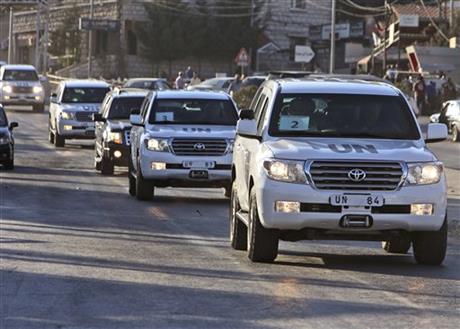
By The Associated Press
The convoy of U.N. experts cross into Lebanon at the Lebanese border crossing point of Masnaa, eastern Bekaa valley, Lebanon, Saturday, Aug. 31, 2013. The U.N. experts investigating last week’s alleged chemical weapons strike outside Damascus left Syria early Saturday and crossed into neighboring Lebanon, departing hours after President Barack Obama said he is weighing “limited and narrow” action against a Syrian regime that the administration has bluntly accused of launching the deadly attack. (AP Photo/Hussein Malla)
The United States is considering launching a punitive strike against the regime of Syrian President Bashar Assad, blamed by the U.S. and the Syrian opposition for an Aug. 21 alleged chemical weapons attack in a rebel-held suburb of the Syrian capital of Damascus. The U.S. said the attack killed 1,429 people, including at least 426 children. Those numbers are significantly higher than the death toll of 355 provided by the aid group Doctors Without Borders.
Here’s a look at key Syria developments around the world Saturday amid heightened tensions over potential military action:
UNITED STATES:
President Barack Obama said he has decided that the United States should take military action against Syria but will seek congressional authorization for the use of force. Obama said he has the authority to act on his own, but believes it is important for the country to have a debate. The White House sent Congress a draft of a resolution seeking approval for a military response to “deter, disrupt, prevent and degrade” the regime’s ability to use chemical weapons going forward. Obama said congressional leadership plans to hold a debate and a vote after Congress goes back to work on Sept. 9.
THE NETHERLANDS:
U.N. chemical weapons inspectors arrived in the Netherlands with samples the team collected during four days of on-site Syria visits. They are expected to be repackaged and sent to European laboratories to be checked for traces of poison gas that may have been used in the alleged chemical attack. The Organization for the Prohibition of Chemical Weapons, based in The Hague, was expected to receive blood and urine samples taken from victims as well as soil samples from affected areas.
SYRIA:
Rebels fighting to topple Assad said they plan an offensive coinciding with any U.S. strikes. Syrian state TV aired Obama’s speech with live translation after earlier showcasing Syrian soldiers training, fighter jets soaring in the sky and tanks firing at unseen targets to the backdrop of martial music. The potential U.S. military strike dominated the station’s morning talk shows.
FRANCE:
President Francois Hollande’s office said he will wait for parliament to consider possible military action against Syria, hewing a close line to Washington while asserting its independence after Obama announced he would put the issue before the U.S. Congress. Hollande noted that he had already decided to convene France’s parliament on Wednesday to take up a debate about Syria.
RUSSIA:
President Vladimir Putin urged Obama to consider whether strikes would help end the violence and be worth likely civilian casualties. Putin said Obama should reflect on the results of U.S. military intervention in Afghanistan and Iraq before deciding whether to launch air strikes against Assad’s regime.
UNITED NATIONS:
U.N. spokesman Martin Nesirky said any notion that the departure of the chemical weapons inspection team from Syria opened a window for a U.S. attack is “grotesque.” He said about 1,000 international and U.N. staff remain in Syria, and the United Nations is just as concerned about their welfare as it was about the inspectors. Nesirky spoke after U.N. disarmament chief Angela Kane briefed Secretary-General Ban Ki-moon on the investigation into the alleged chemical weapons.
MEDITERRANEAN SEA:
Five U.S. Navy destroyers were in the eastern Mediterranean Sea waiting for the order to launch. The destroyers are armed with dozens of Tomahawk cruise missiles, which have a range of about 1,000 nautical miles (1,151 miles, 1,852 kilometers) and are used for precise targeting. French military officials confirmed the frigate Chevalier Paul, which specializes in anti-missile capabilities, as well as the hulking transport ship Dixmude were in the Mediterranean for training and operational preparations but denied any link to possible Syria operations.
ISRAEL:
The Israeli military said it deployed an “Iron Dome” missile defense battery in the Tel Aviv area. If the U.S. attacks Syria over its alleged use of chemical weapons, Israel fears Damascus may respond by firing missiles at Israel, a close American ally.
IRAN:
Alaeddin Boroujerdi, head of the Iranian parliament’s Committee on National Security, visited Damascus to show support for the Syrian regime. He said a strike against Syria will “not be confined to its borders but will have repercussions in the entire region.”
JORDAN:
Information Minister Mohammad Momani said Jordan believes diplomatic efforts must be exhausted before Washington opts for the military option. Demonstrators opposed to military intervention in Syria burned U.S. and Israeli flags and chanted outside the American embassy in the Jordanian capital of Amman. Other protests against a Syria strike took place in the U.S., Britain, France, Germany and Turkey.
ITALY:
Italian Premier Enrico Letta said his country understands why the United States and France are considering military action against Syria’s regime, but said Italy cannot without U.N. backing.



